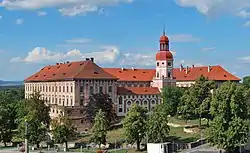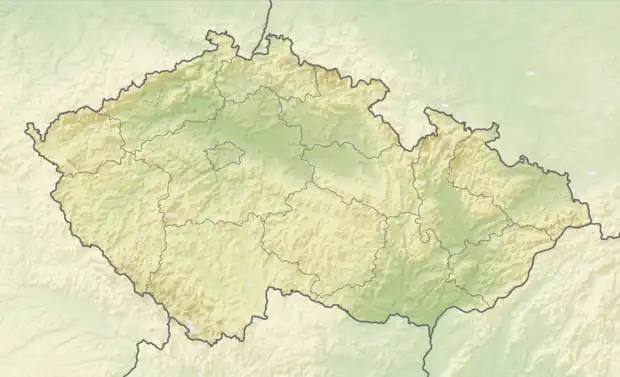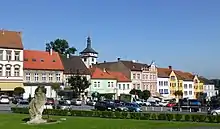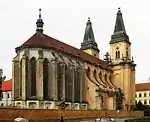Roudnice nad Labem
Roudnice nad Labem (Czech pronunciation: [ˈroudɲɪtsɛ ˈnad labɛm]; German: Raudnitz an der Elbe) is a town in Litoměřice District in the Ústí nad Labem Region of the Czech Republic. It has about 13,000 inhabitants. The historic town centre is well preserved and is protected by law as an urban monument zone.
Roudnice nad Labem | |
|---|---|
 Roudnice Castle | |
 Flag  Coat of arms | |
 Roudnice nad Labem Location in the Czech Republic | |
| Coordinates: 50°25′25″N 14°15′14″E | |
| Country | |
| Region | Ústí nad Labem |
| District | Litoměřice |
| First mentioned | 1167 |
| Government | |
| • Mayor | František Padělek |
| Area | |
| • Total | 16.67 km2 (6.44 sq mi) |
| Elevation | 195 m (640 ft) |
| Population (2023-01-01)[1] | |
| • Total | 12,747 |
| • Density | 760/km2 (2,000/sq mi) |
| Time zone | UTC+1 (CET) |
| • Summer (DST) | UTC+2 (CEST) |
| Postal code | 413 01 |
| Website | www |
A steel road bridge dating from the early 20th century spans the Elbe in Roudnice nad Labem. Its medieval predecessor was the third oldest stone bridge in Bohemia (after Prague and Písek) and the first bridge to connect both banks of the river. Roudnice nad Labem features a castle of late Romanesque origin, now reconstructed in Baroque style.
Administrative parts
The village of Podlusky is an administrative part of Roudnice nad Labem.
Etymology
The original names Rúdnik and Rúdnica probably come from the iron water of a nearby spring (ruda = "ore").[2]
Geography
Roudnice nad Labem is located about 15 kilometres (9 mi) southeast of Litoměřice and 37 km (23 mi) north of Prague. It lies in the Lower Eger Table, in the Polabí lowlands. The highest point is on the hill Hostěraz at 265 metres (869 ft) above sea level. The town is situated on the left bank of the Elbe River, which forms the northern municipal border.
History
.jpg.webp)
Roudnice nad Labem is one of the oldest Czech towns. The first written mentions of Roudnice are from 1167 and 1176,[3] but archeological excavations in the area confirm existence of a prehistoric settlement. The market settlement quickly became economically important due to its location on the Lusatian road, and in the 13th century, it received town status.[2]
In the 12th century, a Romanesque castle was built, used as the summer residence of archbishops and bishops.[4]
In 1333, bishop Jan of Dražice ordered that a bridge be built over the Elbe. It was the first stone bridge over the Elbe and the third stone bridge in Bohemia.[5][6] At the end of the 14th century, the New Town of Roudnice nad Labem (encompassing today's Jan of Dražice Square and Hus Square) was built and, along with the Old Town of Roudnice nad Labem, surrounded by walls.
In 1421, during the Hussite Wars, Roudnice nad Labem was conquered by Jan Žižka. During the Hussite invasions, the local monastery was destroyed and would never be rebuilt. After the Hussite Wars, the town was sold several times, which did not benefit its development. In 1603, it was acquired by the Lobkowicz family and it remained under their control until 1945. During their rule, the town was rebuilt and expanded. During the Thirty Years' War, Roudnice nad Labem was burned down and demolished by the Swedish army.[2]
In the 19th century, Roudnice nad Labem became the industrial and economical centre of the Podřipský region, due to several new factories and the railway from Prague to Dresden.[2] Until 1918, Roudnice – Raudnitz was part of Austria-Hungary, in the district of the same name, one of the 94 Bezirkshauptmannschaften in Bohemia.[7]
The first football match in the Austro-Hungarian Empire and in the Czech lands took place on the islet in the middle of the Elbe, located within the town limits, in 1887 (in 1892, according to some sources).[8] In 1910, the old stone bridge was rebuilt into a new steel road bridge.[5]
Demographics
|
|
| ||||||||||||||||||||||||||||||||||||||||||||||||||||||
| Source: Censuses[9][10] | ||||||||||||||||||||||||||||||||||||||||||||||||||||||||
Education
There are four high schools in Roudnice nad Labem: Gymnasium, Vocational School and Training Centre, Podřipská Private Vocational School and Training Centre, and Higher Vocational School and Secondary Vocational School, which also offers higher education.[11] There are also six primary schools, including one primary art school and one special school.[12]
Sport
The town has a swimming pool, an ice hockey arena, and football and athletic stadiums. Roudnice airport is located near the southwestern edge of the town and hosts the Memorial Air Show every other year.
Sights

The historic centre is made up of the castle complex and of Charles Square (Karlovo náměstí), Hus Square (Husovo náměstí), Purkyně Square (Purkyňovo náměstí) and Jan of Dražice Square (náměstí Jana z Dražic). The town hall is located on Charles Square. It is a pseudo-Renaissance building from 1869.[6]
The Gothic stone watchtower is the only preserved remnant of the Old Town's fortifications. It is open to the public as a lookout tower.[6]
The church complex is formed of the Church of the Nativity of the Virgin Mary and the Augustinian monastery. The monastery was built in 1333–1353. The church is a typical Czech Gothic building from the first half of the 14th century. The iron spring after which the town got its name is located there.[6]
Roudnice Castle
Roudnice Castle was built in the 12th century by Prague bishops to protect an important trade route from Prague to Upper Lusatia along the Elbe. In the 14th and 15th centuries, it was rebuilt in the Gothic style and became a popular summer residence for Prague bishops.[4] There is a common misconception that Jan Hus was ordained as a priest there.[13]
In 1421, the Catholic Church sold the castle to Jan Smiřický, who renovated it once again. King George of Poděbrady captured Roudnice from Smiřický in 1467. It passed into the ownership of William of Rosenberg, the Supreme Burgrave and one of the wealthiest men in Bohemia. After Rosenberg's death, his widow Polyxena Pernštejn married Zdeněk Vojtěch of Lobkowicz, Chancellor of the Czech Kingdom and later 1st Prince Lobkowicz, bringing Roudnice into the Lobkowicz family possessions.[4]
In 1652, their son Václav Eusebius embarked upon an ambitious project to transform the castle into an early baroque palace. From 1657 until the World War II the Lobkowicz Collection's library was stored in Roudnice Castle, leading to the library being named the Roudnice Lobkowicz Library.
Václav Eusebius of Lobkowicz hired two Italian architects, Francesco Caratti and Antonio della Porta, to completely renovate Roudnice Castle. Between 1652 and 1684, they demolished most of the original structure, creating a 200-room baroque residence that included a clock tower, a chapel decorated with elaborate frescoes, a theatre, and large formal gardens. For two and a half centuries Roudnice served as a repository for the Lobkowicz family's collections of artwork, religious objects, musical instruments, and books and manuscripts.[4]
The castle was confiscated by the Communist government in 1948; the Czechoslovak People's Army used the building for the Vít Nejedlý military music school, as well as for administrative offices. After 1989, the castle was restored to the Lobkowicz family, who continued to rent the castle to the school until it closed in 2008. In 2009 the castle underwent major renovations, and it was opened to the public.[4]
The Castle Riding Hall was built in the 17th century by Antonio della Porta. Today it houses the Gallery of Modern Art.[6]
Notable people
- Cola di Rienzo (1313–1354), Italian politician; imprisoned for a time at the Roudnice castle
- Abraham ben Saul Broda (c. 1640–1717), Rabbi in Roudnice
- Emanuele d'Astorga (1680–1736), Italian componist
- Seligmann Heller (1831–1890), Austrian poet
- Max Dvořák (1874–1921), art historian
- Arthur Breisky (1885–1910), writer
- Georg Wilhelm Pabst (1885–1967), Austrian film director and screenwriter
- Kurt Epstein (1904–1975), water polo player, survivor of the Holocaust
- Vladimír Černík (1917–2002), tennis player
- Svatopluk Beneš (1918–2007), actor
- Lenka Bradáčová (born 1973), lawyer
- Roman Týce (born 1977), footballer
- Pavlína Ščasná (born 1982), footballer
- Jana Komrsková (born 1983), artistic gymnast
Twin towns – sister cities
Roudnice nad Labem is twinned with:[14][15]
 Dessau-Roßlau, Germany
Dessau-Roßlau, Germany Ruelle-sur-Touvre, France
Ruelle-sur-Touvre, France
Gallery
 Church of the Nativity of the Virgin Mary
Church of the Nativity of the Virgin Mary Church of the Nativity of the Virgin Mary
Church of the Nativity of the Virgin Mary Belfry and church as seen from the Watchtower
Belfry and church as seen from the Watchtower The Watchtower
The Watchtower Town hall
Town hall
References
- "Population of Municipalities – 1 January 2023". Czech Statistical Office. 2023-05-23.
- "Historie města Roudnice nad Labem" (in Czech). Město Roudnice nad Labem. Retrieved 2021-07-23.
- "Vyhodnocení vlivů Zm. č. 9 ÚP Roudnice n.L. na životní prostředí" (PDF) (in Czech). Město Roudnice nad Labem. December 2018. p. 22. Retrieved 2021-07-23.
- "History of Roudnice Castle". House of Lobkowicz. Retrieved 2021-07-23.
- "Železný most přes Labe v Roudnici nad Labem" (in Czech). Turistika.cz. Retrieved 2021-07-23.
- "Památky" (in Czech). Město Roudnice nad Labem. Retrieved 2021-07-23.
- Die postalischen Abstempelungen auf den österreichischen Postwertzeichen-Ausgaben 1867, 1883 und 1890, Wilhelm Klein, 1967
- "První zápas českého fotbalu se hrál v Roudnici před 130 lety. Nebo ne? Historici se rozcházejí" (in Czech). Czech Radio. 2017-09-29. Retrieved 2022-09-08.
- "Historický lexikon obcí České republiky 1869–2011 – Okres Litoměřice" (in Czech). Czech Statistical Office. 2015-12-21. pp. 13–14.
- "Population Census 2021: Population by sex". Public Database. Czech Statistical Office. 2021-03-27.
- "Střední školy v Roudnice nad Labem". Atlas školství (in Czech). Retrieved 2022-09-08.
- "Základní školy v ČR: Roudnice nad Labem". Atlas školství (in Czech). Retrieved 2022-09-08.
- "Jan Hus. Vše, co jste o životě církevního reformátora nevěděli" (in Czech). Czech Radio. 2022-07-06. Retrieved 2022-09-08.
- "Unsere Städtepartnerschaften" (in German). Stadt Dessau-Roßlau. 24 May 2017. Retrieved 2019-08-23.
- "Stránky o přátelství" (in Czech). Roudnice-Ruelle. Retrieved 2019-08-26.
External links
- Official website
- Roudnice nad Labem – regional tourist portal
- Chisholm, Hugh, ed. (1911). . Encyclopædia Britannica. Vol. 22 (11th ed.). Cambridge University Press. p. 921.